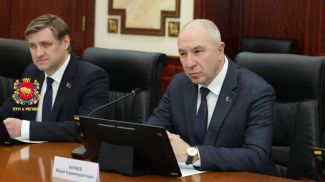MINSK, 27 June (BelTA) - The economic targets for the next five years remain the same, Belarusian Deputy Economy Minister Dmitry Yaroshevich told the media in Minsk on 27 June, BelTA has learned.
Belarus' GDP contracted by 3.4% in January-May. "The economy has slowed, but it was expected. Now foreign economic activity is undergoing a deep transformation. A slow down was necessary to redirect trade flows. We expect the trend to change in H2," Dmitry Yaroshevich noted.
He stressed that the parameters that were approved by the Belarusian People's Congress and the program of social and economic development for the five-year period remain relevant. "These goals will be met in the long term," the deputy minister said. According to him, the GDP forecast for 2022 [an increase of 2.9%] will not be revised for the time being.
A comprehensive plan to support the economy has been adopted, and an operational and situational center has been set up at the Council of Ministers. A number of regulatory legal acts are being prepared to support business and to ensure that enterprises feel less sanctions pressure. “These measures have already been producing results, but we need to use them to the full in H2 2022. We are ready to consider business proposals as well. There are still the most controversial issues concerning verification activities. We are actively working on the matter now. We will be supporting the manufacturing business in every way, but it does not mean that the service business will be outside the focus of our attention,” the deputy minister said.
According to him, many industries have already found logistics solutions. “Of course, those who have sold big volumes will need more time,” Dmitry Yaroshevich added.
“GDP is no doubt an important indicator. Households, however, prioritize other things, such as salaries. In January-May 2022, the average salary in real terms has not dropped, the growth rate was above 100%. We rely on the instructions given as part of the Belarusian People's Congress. They include not only GDP, but also people's incomes and the ability to realize their needs. Import substitution and regional development remain relevant as well. There is no need to adjust these tasks. However, we will need to choose other tools for their implementation,” the deputy minister said. The approaches to export diversification are also changing due to the sanctions.













